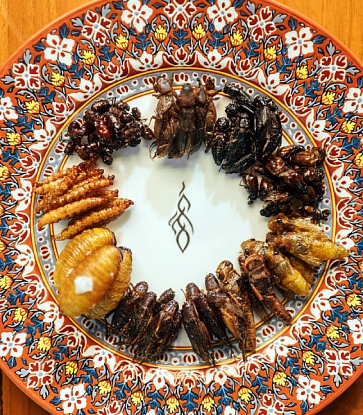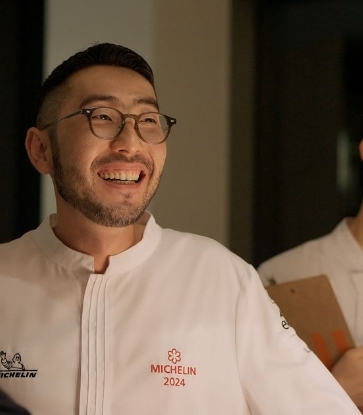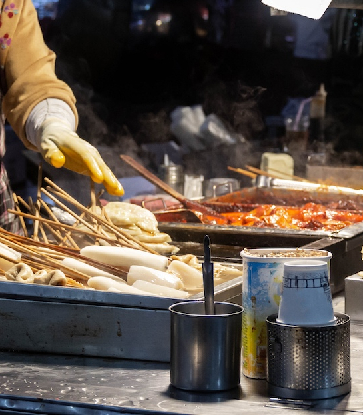“We aim to capture the essence of the changing seasons through the rich ingredients found in Busan.”
Mori, a Japanese restaurant located along the coastline of Busan, was awarded its first MICHELIN star in 2024. The restaurant has garnered a devoted following by maximizing its prime location and crafting kaiseki-style courses that highlight the natural, refined flavors of the abundant local seafood.
Chef Kim Wan-kyu’s passion for cooking is ignited by his customers. The concept of Mori revolves around expressing the seasons of Busan through the region's rich ingredients. “Busan, being a coastal city, offers a wealth of seafood that continually inspires our dishes. We design our menu to reflect the changing seasons of Busan,” he explained. “The most rewarding moment is when our guests enjoy the meals we’ve prepared with such care from the crack of dawn. Hearing them say ‘delicious’ deepens my love for cooking day by day.”
Receiving a MICHELIN star marked a pivotal moment in his culinary career. “When I received the MICHELIN star, it felt like all my hard work had finally paid off. It brought a lot of attention to our restaurant, and we’ve been able to establish ourselves as a beloved dining destination. I want to continue working hard to create a place that people love even more,” he said.
Discovering the Allure of Cooking as an military cook
Chef Kim first discovered his passion for cooking while serving as an military cook. “I became interested in cooking while working as a cook in the army. Handling ingredients and seeing people enjoy the food I prepared made me realize the joy of cooking,” he recalled. After his service, he decided to pursue a career as a chef. “I was deeply impressed by the chefs working behind the counter during my military service, which inspired me to dive into Japanese cuisine after being discharged,” he added.
His culinary journey began at a Japanese restaurant in his hometown of Changwon. At the young age of 22, he stepped into the kitchen for the first time, diligently building his skills and experience. But his passion didn’t stop there. “I felt that my experience in Korea wasn’t enough. To truly learn Japanese cuisine, I moved to Japan at the age of 29 to continue my training,” he shared.
Finding a Mentor and Establishing a Culinary Philosophy in Japan
One of the biggest challenges chef Kim faced was when he first started learning Japanese cuisine. “When I began, I questioned whether what I was creating was truly Japanese cuisine. To resolve this doubt, I decided to leave everything behind in Korea and study in Japan, which was the biggest challenge I faced,” he reflected. As for overcoming challenges, he believes, “When faced with difficulties, I think the key is to correct mistakes and try new approaches.”
His experience in Japan had a profound impact on his culinary philosophy. Particularly, Principal Hasegawa at the Tokyo Sushi and Cuisine School became a mentor and pillar of support in his culinary life. “Hasegawa-sensei taught me not only the basics of cooking but also the mindset and attitude of a chef. His teachings remain at the core of my culinary philosophy to this day,” he said.
Opening 'Mori' in Busan: Embracing Natural Flavors and Seasonality
At 35, Chef Kim returned to Korea and opened Mori, a Japanese restaurant in Busan. The restaurant's name was inspired by his wife. Chef Kim’s philosophy centers on pursuing natural flavors and creating healthy dishes using seasonal ingredients. “I use seasonal ingredients to capture natural flavors. I aim to create dishes that satisfy all the senses—sight, touch, taste, and smell—while also being good for your health,” he explained.

One of his signature dishes, tilefish and corn rice, is made by purchasing the best tilefish at auction, cooking the rice with kelp from Gijang, and preparing it with corn and green peppers. “The tilefish is cleaned, soaked in brine, dried for half a day, and then grilled over charcoal. It’s a dish that encapsulates the freshness of summer,” he described.

Another signature dish, grilled sweetfish, is a fish commonly enjoyed during the summer in Japan. Although it used to be a common catch along Korean riversides, only larger sizes are now available, so he orders young fish from a sweetfish farm in Miryang a year in advance, waiting until they grow to the perfect size for summer. The fish is skewered head down and slowly grilled over binchotan charcoal. This process allows the fat to move toward the head, creating a crispy texture like tempura, while the body is roasted to a savory finish, and the tail has a dried, chewy texture after being slowly grilled over time.
Chef Kim values the balance between tradition and creativity. “Traditional cuisine is a cultural expression passed down through generations. While I respect the meaning of that tradition, I also strive to create new dishes by adding modern techniques and delicate touches,” he said. He emphasized that it’s the chef’s role to maintain the essence of tradition while transforming it into something new.
Mori’s future goal is to establish itself as a restaurant that represents the region. “I want to train more young chefs and create more Japanese restaurants that lead the specialization of Busan’s marine products,” he shared. He also expressed his ambition to grow Mori into a brand that represents Busan’s cuisine.
For aspiring chefs, Chef Kim shared: “If you work hard, you will definitely achieve good results. The path of cooking is never easy, but the sense of fulfillment you gain from the process is immeasurable. Don’t give up and keep challenging yourself until the end.”





















